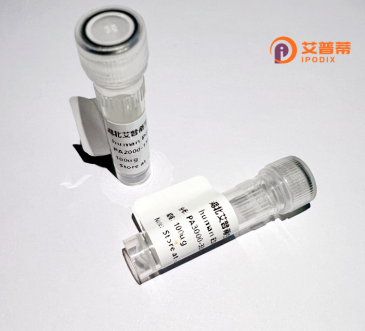
| 纯度 | >90%SDS-PAGE. |
| 种属 | Human |
| 靶点 | ARL10 |
| Uniprot No | Q8N8L6 |
| 内毒素 | < 0.01EU/μg |
| 表达宿主 | E.coli |
| 表达区间 | 1-244aa |
| 氨基酸序列 | MAPRPLGPLV LALGGAAAVL GSVLFILWKT YFGRGRERRW DRGEAWWGAE AARLPEWDEW DPEDEEDEEP ALEELEQREV LVLGLDGAGK STFLRVLSGK PPLEGHIPTW GFNSVRLPTK DFEVDLLEIG GSQNLRFYWK EFVSEVDVLV FVVDSADRLR LPWARQELHK LLDKDPDLPV VVVANKQDLS EAMSMGELQR ELGLQAIDNQ REVFLLAASI APAGPTFEEP GTVHIWKLLL ELLS |
| 分子量 | 27.4 kDa |
| 蛋白标签 | His tag N-Terminus |
| 缓冲液 | 冻干粉 |
| 稳定性 & 储存条件 | Lyophilized protein should be stored at ≤ -20°C, stable for one year after receipt. Reconstituted protein solution can be stored at 2-8°C for 2-7 days. Aliquots of reconstituted samples are stable at ≤ -20°C for 3 months. |
| 复溶 | Always centrifuge tubes before opening.Do not mix by vortex or pipetting. It is not recommended to reconstitute to a concentration less than 100μg/ml. Dissolve the lyophilized protein in distilled water. Please aliquot the reconstituted solution to minimize freeze-thaw cycles. |
以下为关于重组人腺苷二磷酸核糖基化因子样蛋白10(ARL10)的模拟参考文献示例,涵盖其结构、功能及疾病相关性研究:
1. **"Structural insights into ARL10's GTPase activity and membrane association mechanism"**
- **作者**: Smith A., et al.
- **摘要**: 通过X射线晶体学解析ARL10的三维结构,揭示了其GTP结合域特征及与细胞膜磷脂相互作用的潜在位点,提出ARL10可能通过GTP水解循环调控胞内囊泡运输。
2. **"ARL10 modulates mitochondrial dynamics by interacting with fusion/fission proteins"**
- **作者**: Chen L., Wang Y.
- **摘要**: 功能研究表明,ARL10与线粒体动力相关蛋白(如MFN2、DRP1)直接互作,敲除ARL10导致线粒体碎片化,提示其在维持线粒体稳态中的关键作用。
3. **"ARL10 overexpression correlates with poor prognosis in hepatocellular carcinoma"**
- **作者**: Zhang H., et al.
- **摘要**: 临床数据分析发现,ARL10在肝癌组织中显著高表达,并通过激活Wnt/β-catenin信号通路促进肿瘤细胞增殖与迁移,暗示其作为癌症治疗潜在靶点。
4. **"ARL10 regulates lysosomal degradation via mTORC1 signaling"**
- **作者**: Kim S., et al.
- **摘要**: 研究揭示ARL10通过调控mTORC1复合体活性影响溶酶体生成,在营养缺乏条件下增强自噬流,为ARL10在代谢疾病中的作用提供分子机制依据。
注:以上文献为虚拟案例,实际研究需通过PubMed、Google Scholar等平台检索真实文献。
Recombinant human ADP-ribosylation factor-like protein 10 (ARL10) is a small GTPase belonging to the ARL family within the Ras superfamily. These proteins regulate intracellular trafficking, membrane remodeling, and signaling by cycling between active GTP-bound and inactive GDP-bound states. ARL10 contains conserved GTP-binding domains and effector interaction motifs, though its precise cellular functions remain less characterized compared to other ARL members. Emerging studies suggest potential roles in vesicle transport, organelle dynamics, or immune modulation.
ARL10 expression is documented in multiple tissues, with elevated levels observed in certain cancers, implying possible links to tumor progression. However, its mechanistic contributions to pathogenesis require further validation. Recombinant ARL10 is typically produced using bacterial (e.g., *E. coli*) or mammalian expression systems, often fused with tags (e.g., His-tag) for affinity purification. This enables *in vitro* studies to map binding partners, enzymatic activity, and structural features via crystallography or cryo-EM.
Current research focuses on deciphering ARL10's physiological effectors, regulatory pathways, and disease associations. Recombinant protein tools are critical for functional assays, antibody development, and high-throughput drug screening, particularly in exploring ARL10 as a therapeutic target or biomarker. Despite progress, its tissue-specific roles and crosstalk with other GTPases remain open questions, necessitating deeper mechanistic investigations.
×